 Born in Kabul, Horace Shansab lived in Afghanistan before fleeing the country for Europe and then immigrating to the US with his family in 1980. He worked in the documentary field for many years at National Geographic Television, and then filmed and produced several documentaries. Zolykha’s Secret is his debut feature narrative film set in Afghanistan.
Born in Kabul, Horace Shansab lived in Afghanistan before fleeing the country for Europe and then immigrating to the US with his family in 1980. He worked in the documentary field for many years at National Geographic Television, and then filmed and produced several documentaries. Zolykha’s Secret is his debut feature narrative film set in Afghanistan.
Zolykha’s Secret is the story of a rural Afghan family living at the base of a mountain. The family struggles to survive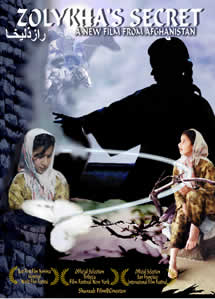 during the last year of the Taliban and the beginning of a new war that still rages. Living under harsh and oppressive conditions, the family finds comfort in one another and in trying to rebuild their mountainous home. The youngest daughter “Zolykha” is specially receptive, curious and clairvoyant. Zolykha can sense and see spirits of strange men from the past, that roam the hills and mountains behind her home. As Zolykha and her older siblings, Amena and Zalmai struggle to find meaning in life’s natural and man-made tragedies, they discover new convictions to carry on.
during the last year of the Taliban and the beginning of a new war that still rages. Living under harsh and oppressive conditions, the family finds comfort in one another and in trying to rebuild their mountainous home. The youngest daughter “Zolykha” is specially receptive, curious and clairvoyant. Zolykha can sense and see spirits of strange men from the past, that roam the hills and mountains behind her home. As Zolykha and her older siblings, Amena and Zalmai struggle to find meaning in life’s natural and man-made tragedies, they discover new convictions to carry on.
Shohreh Jandaghian – Where did you get your inspirations to write about this theme?
Horace A. Shansab – After years of simultaneously fighting for their freedom, and the West’s surrogate war against communist Soviet Union, Afghanistan was devastated. But, I was inspired by the resilience of Afghans, their capacity to try to find significance and meaning in some of the worst suffering. I am inspired by the sense of humour that exists among Afghans, 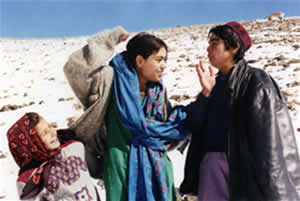 even though fate has destined them for a very harsh and difficult life. I was inspired by the sweet innocence that exists in Afghanistan next to all the ignorance, violence and wars. I was inspired by innocent Afghan women and children, who have been suffering without a voice, and are still suffering today. I was inspired by the stories that I heard, when I returned to Afghanistan.
even though fate has destined them for a very harsh and difficult life. I was inspired by the sweet innocence that exists in Afghanistan next to all the ignorance, violence and wars. I was inspired by innocent Afghan women and children, who have been suffering without a voice, and are still suffering today. I was inspired by the stories that I heard, when I returned to Afghanistan.
ShJ – So, the film is not based on personal experience of living in Afghanistan during Taliban era… 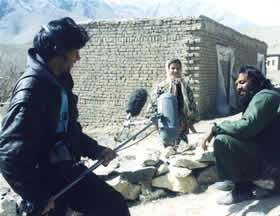
Horace – I knew people who lived through the Taliban era and of their plight. Some of the most courageous people I know tried to survive and help others during that period. Some of them are remarkable women and artists. The Taliban arrived as a result of already existing, horrific conditions in Afghanistan. Some of their original intentions and promises might have been benevolent, but they soon abused their power and degenerated into oppressors. Sadly, millions of Afghans, especially women continued to suffer unnecessarily. That period was also terribly cruel for minorities such as the Hazaras.
ShJ – Please let us know more about Zolykha’s character as the film is named after her.
Horace – Zolykha is the younger daughter of the family. She is full of life and has a natural curiosity about her surroundings, nature, her family, about everything she perceives. Most children have that magical sense of awe and wonder. Children possess imaginations that are free, full of possibilities, full of perspectives. They also possess the innocence to imagine and believe so deeply, that they create this sort of infinite reality…They create a consciousness, a fantasy that is magical but far from delusional; a consciousness with its own magical realism and dynamic energy.
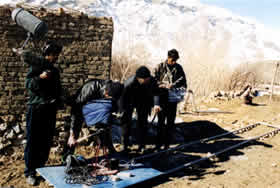 ShJ – Though we see more and more the female presence in Afghan films since the fall of the Taliban regime, but it still remains a Taboo for women to appear on screen in Afghanistan. Concerning that, how did you persuade the Afghan women to participate in your film project?
ShJ – Though we see more and more the female presence in Afghan films since the fall of the Taliban regime, but it still remains a Taboo for women to appear on screen in Afghanistan. Concerning that, how did you persuade the Afghan women to participate in your film project?
Horace – Well, that was one of our major problems… finding female actors. Much of conservative Afghanistan still frowns upon women participating in the arts. So it is always a challenge to find women (and their families) who are willing to participate in the arts and appear on film. I was very careful to make sure that all the women in our film had the permission, support and blessing of their families, particularly from their fathers, brothers and husbands.
ShJ – Where do you think this “mistrust” comes from?
Horace – Actually, in our part of the world there is a very awkward and unhealthy attitude by men towards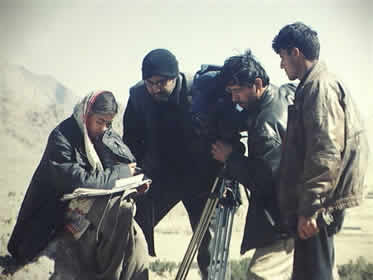 women. While women are considered the ultimate symbols of honour and love, Afghans refer to them as their “Nahmus”, they are also perceived as lesser human beings. They’re considered inferior, weak in the face of temptation and threateningly impulsive and emotional. In short, men believe that they must control women and not allow them to lose their senses. Men also fear that women, by being free individuals might “embarrass their families” and bring “shame and dishonour to their egos and social standing”. I always found it very strange as it is women who give birth to all those pious men of honour and who claim to know better. I don’t think our part of the world needs to copy the West and its culture, but we must face the challenge that women in our countries have always been marginalized and not allowed to be full participants. I believe that preventing half of the population to express themselves has hurt our countries and our cultures. Women can be good mothers, wives, honourable members of a family and still express themselves, sing a beautiful melody, be creative through the arts, engage in productive actions and live full honourable lives. Men should not be so threatened, so weak and small-minded to feel threatened by the freedom of women. On the contrary, as men, we should all make sure to defend their freedom and protect it like our own. Again, women in our countries don’t need to imitate some of the decadence and selfishness prevalent elsewhere. But, with all the restrictions in the world, with all the threats and control, if a woman has low or bad morals, she will be immoral, just like a man. It’s a shame and dishonour upon all of us, if our mothers, sisters and wives are treated as inferior, as lesser human beings. It is also a cultural tragedy of immense proportions, if they’re not allowed to live to their fullest potential and offer their most wonderful contributions to all us of… in addition to their motherly love and female affection.
women. While women are considered the ultimate symbols of honour and love, Afghans refer to them as their “Nahmus”, they are also perceived as lesser human beings. They’re considered inferior, weak in the face of temptation and threateningly impulsive and emotional. In short, men believe that they must control women and not allow them to lose their senses. Men also fear that women, by being free individuals might “embarrass their families” and bring “shame and dishonour to their egos and social standing”. I always found it very strange as it is women who give birth to all those pious men of honour and who claim to know better. I don’t think our part of the world needs to copy the West and its culture, but we must face the challenge that women in our countries have always been marginalized and not allowed to be full participants. I believe that preventing half of the population to express themselves has hurt our countries and our cultures. Women can be good mothers, wives, honourable members of a family and still express themselves, sing a beautiful melody, be creative through the arts, engage in productive actions and live full honourable lives. Men should not be so threatened, so weak and small-minded to feel threatened by the freedom of women. On the contrary, as men, we should all make sure to defend their freedom and protect it like our own. Again, women in our countries don’t need to imitate some of the decadence and selfishness prevalent elsewhere. But, with all the restrictions in the world, with all the threats and control, if a woman has low or bad morals, she will be immoral, just like a man. It’s a shame and dishonour upon all of us, if our mothers, sisters and wives are treated as inferior, as lesser human beings. It is also a cultural tragedy of immense proportions, if they’re not allowed to live to their fullest potential and offer their most wonderful contributions to all us of… in addition to their motherly love and female affection.
ShJ – Regarding your first filmmaking experience in Afghanistan, how do you see the current situation of filmmaking in the country?
Horace – Film making in Afghanistan is still very difficult and quite rough. However there are great talents in Afghanistan and some wonderful filmmakers that would love to make films and express themselves through cinema. My good friend Siddiq Barmak is one of those filmmakers. There are some others who are deeply passionate about telling their personal stories through film or other artistic mediums. A few years ago, I taught a group of young Afghan women a class in visual story telling. They had all been prevented from attending school during the Taliban period and had suffered a great deal during the preceding civil war. They knew very little at first, but they all became wonderful, cinematic storytellers by the end.
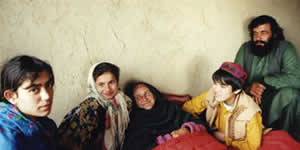 Considering my own film, I’m very proud of the cast and crew of Zolykha’ s Secret who worked so passionately and tirelessly to tell this story of an Afghan family and bring it to the screen. I think they all reached very deeply into their souls to give their most genuine effort. Our skeleton crew was also able to do a few things, which have not been done before. We all took chances, and we had a bid of luck to make it happen inside Afghanistan.
Considering my own film, I’m very proud of the cast and crew of Zolykha’ s Secret who worked so passionately and tirelessly to tell this story of an Afghan family and bring it to the screen. I think they all reached very deeply into their souls to give their most genuine effort. Our skeleton crew was also able to do a few things, which have not been done before. We all took chances, and we had a bid of luck to make it happen inside Afghanistan.
You know… I believe in the arts and in cinema. If they’re done well and responsibly, they can nurture the soul.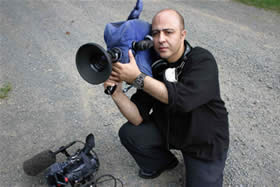 We must make sure that younger Afghans have the opportunity to study and learn the arts. Arts and education are the most important, the most valuable tools in the hands of young Afghans. Hopefully, they will receive some much needed help. The wars have taken too terrible a toll on the country to be self-sufficient at the present time. We must invest in the young generation each and every day.
We must make sure that younger Afghans have the opportunity to study and learn the arts. Arts and education are the most important, the most valuable tools in the hands of young Afghans. Hopefully, they will receive some much needed help. The wars have taken too terrible a toll on the country to be self-sufficient at the present time. We must invest in the young generation each and every day.
ShJ – What would be your advise to young Afghan Filmmakers?
Horace – To think about what matters to them, what touches them, what moves them, what makes them laugh or cry; to get to know themselves and be observant of others; and then to go out, be courageous and make films; and to cherish the process of creating and collaborating all in peace.
ShJ – Thank you for your time.

